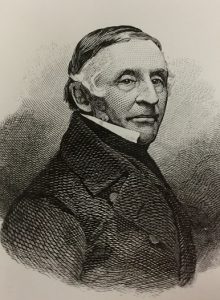(This post was written by Nancy Mary Panella, Ph.D., Archivist Emeritus, St. Luke’s and Roosevelt Hospitals)
James Henry Roosevelt, whose bequest founded the Roosevelt Hospital, was the son of James Christopher Roosevelt (1770-1840) and Catherine Byvanck Roosevelt (1773-18??). He was also a distant cousin of President Theodore Roosevelt.
James Henry was born at his family’s home on Warren Street in lower Manhattan on November 10, 1800. Following his earlier education in neighborhood schools, he enrolled in Columbia College, where his studies included law, and was graduated from there in 1819. He subsequently set up a law practice in New York City.
With his studies behind him, and his law practice established, he stood on the threshold of a promising life: Described as a young man of pleasing appearance, brown hair, above-average height and with a gentle and courteous demeanor, he was well-to-do, brilliant, and engaged to be married to Julia Boardman, who was from an old New York City family.
But, suddenly, an illness that left him physically disabled struck, ending his plans for both career and marriage. The exact nature of the illness is unclear: Some speculated that it was lead poisoning from a home remedy for a cold, concocted of hot milk into which lead shot had been boiled. Others think he fell victim to poliomyelitis.
In any case, largely incapacitated, he abandoned his law practice. Not wanting to ‘burden’ Julia Boardman with his disability, he broke his engagement to her. (Neither married and both remained lifelong friends; in fact, one of the few bequests he made, outside of the one to his nephew, James C. Roosevelt Brown, and the monies left to found The Roosevelt Hospital, was an annuity for Ms. Boardman, whom he also named as executrix of his will.)
James Henry then embarked on a life not just of physical limitations, but also of frugality and austerity, devoting much of his time and interests to real estate dealings and to the management of his securities; he thus increased his worth substantially. It is thought that he conserved and increased his funds for one specific purpose: to support “the establishment in the City of New York of an [sic] hospital for the reception and relief of sick and diseased persons.” Whatever the reason, when he died in 1863, he left in excess of one million dollars toward that objective.
The hospital to be founded under the terms of his will was to be a voluntary hospital that cared for individuals regardless of their ability to pay. It seems reasonable to suppose that having himself suffered from illness, he realized the plight of those who might at the same time be afflicted with both sickness and destitution.
It is said that James Henry was never morose or gloomy. He maintained an active interest in the life about him and in the affairs in which he could not participate. He enjoyed the companionship of a host of friends, one of the closest being Julia Boardman.
Although James Henry Roosevelt’s remains were first buried in his family’s vault in the New York City Marble Cemetery, they were moved to the Roosevelt Hospital grounds when a monument to him was placed there in 1876. Moved twice again on the hospital grounds (hospital expansion required the moves), in late 1994 his remains were exhumed, and in the spring of 1995 re-interred in the New York City Marble Cemetery. Julia Boardman’s remains were interred in the same cemetery, but in her father’s vault.

